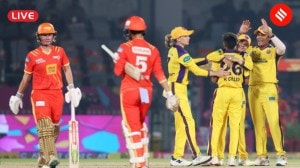Their January Spring
It began last April in Srinagar when Prime Minister Atal Behari Vajpayee offered a hand of friendship to Pakistan. And today, over a histori...

It began last April in Srinagar when Prime Minister Atal Behari Vajpayee offered a hand of friendship to Pakistan. And today, over a historic handshake, the two leaderships agreed to set aside their hostility and mistrust. Both sides have pledged to sit across the table in February to start a 8216;8216;composite dialogue8217;8217; expected to discuss the two key issues of ending cross-border terrorism and Kashmir.
In a joint statement released this afternoon that was clearly aimed to please both domestic audiences, Pakistan promised to prevent violence, hostility and terrorism, as well as ban any terrorist activity emanating from its territory. In return, India pledged to resume the stalled dialogue and discuss Kashmir.
Clearly, it was the nature of the reciprocal deal, where one state would deliver on its part of the promise at the same time as the other, that cracked the conundrum.
India dropped its two-year-old precondition that cross-border terrorism must stop before talks could start. Pakistan, essentially, repeated what General Musharraf had said during his January 12, 2002 address to the nation, except that then New Delhi had been too furious to listen.
8216;8216;This is a win-win situation for both countries,8217;8217; Musharraf told an end-of-the visit press conference, adding, 8216;8216;There are no winners and no losers. It is a victory for the people of India and Pakistan. This is a beginning and not an end. We will move forward with hard work, sincerity and trust in each other.8217;8217;
In the joint statement, Musharraf publicly reassured the PM that 8216;8216;in order to take forward and sustain the dialogue process, violence, hostility and terrorism must be prevented.8217;8217; India is believed to have demanded such a public assurance from Islamabad before Vajpayee left Pakistani soil.
On his part, the PM committed himself to a time-table8212;a February composite dialogue, where all issues, including Jammu 038; Kashmir, would 8216;8216;lead to a peaceful settlement to the satisfaction of both sides.8217;8217;
A much mellowed Musharraf, who patiently answered questions by journalists from both countries at a press conference that lasted over an hour, described the 8216;8216;linkages8217;8217; in three areas that were expected to now sustain the incipient peace process of the last few months.
First, moving forward on confidence-building measures on both sides; second, initiation and progress in a composite dialogue that would include Kashmir, and third, a Pakistani resolve to fight terrorism and not allow Pakistan territory to be used by terrorists anywhere in the world.
The Indian side also pulled out their power-brokers in a press conference in the afternoon. Flanked by Principal Secretary Brajesh Mishra who repeatedly denied that he had met the director-general of the ISI in Islamabad over the last few days and India8217;s high commissioner to Pakistan Shiv Shanker Menon, External Affairs minister Yashwant Sinha told journalists that regarding terrorism, 8216;8216;there was a certain situation on the ground, and that we are proceeding from an assurance given to us. There would be no joint statement if there was no such assurance.8217;8217;
And significantly, he pointed out that 8216;8216;there was certainly the possibility and likelihood of cooperation to fight terrorism together.8217;8217;
Musharraf also played to the hilt his role of a peace-maker in a script that seemed not only pre-cooked but one that had been jointly written by both sides.
Sources here said that at the one-hour-long meeting between the President and the Prime Minister yesterday, Musharraf pointed out to the PM that he was the one who had said that the peace process must be carried forward. One of the ways to do this, the President said, would be to have a composite dialogue and talk on the basic issues. That was when both sides put together the agreed format that was issued today.
8216;8216;It is too early and too premature to talk about solutions. A step by step approach is required. We have taken a great leap forward, we have to sustain this leap. The dialogue process hasn8217;t started yet, it is still at the take-off point,8217;8217; Musharraf said, in answer to several questions on whether he had abandoned the Pakistani position of Kashmir being the 8216;8216;core8217;8217; issue and what solutions he now had in mind.
The President pointed out that 8216;8216;friendship was important with India,8217;8217; if only because it was the largest country in the region. But he also referred to his fears of derailment of the peace process. 8216;8216;Bhatakna nahin chahiye, pareshaan nahin hona chahiye, hum poori koshish karenge, aavam ko phayda pahunchna chahiye we must not be impatient, but try very hard to keep to the course, because that would lead to progress for the people,8217;8217; he said.
But Musharraf also indicated that he might not be able to control the Kashmiri terrorists for too long if Islamabad did not receive its part of the deal from India. 8216;8216;I can never guarantee a ceasefire on whatever is happening within kashmir, but I said I could facilitate it. If I propose a ceasefire, maybe my words would carry weight for people looking for some way out8230;the effectiveness of my words will be enhanced if we start moving forward,8217;8217; he said.
He warned that 8216;8216;there were extremists on both sides8217;8217; who may not want peace between the two nations. These were people with 8216;8216;extreme positions,8217;8217; he said. It was imperative that both sides forget their differences while taking the peace process forward and focus on their convergences.
- 01
- 02
- 03
- 04
- 05































